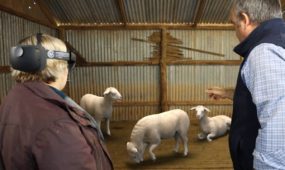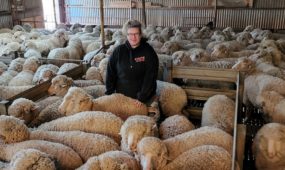Potato crops saved with award-winning DNA test
Primary Industries
DNA testing is the new secret weapon for farmers looking to avoid potential disease risk and boost productivity.

Sign up to receive notifications about new stories in this category.
Thank you for subscribing to story notifications.
A diagnostic system that tests for six soil-borne pathogens that threaten potato crops recently won an Australian horticulture award, and scientists at the South Australian Research and Development Institute (SARDI) already are looking to adapt it for other high-value vegetables.
PreDicta Pt was launched commercially last August and has received widespread support from growers, processors and agronomists across Australia.
Potatoes are particularly susceptible to soil-borne disease that can damage their appearance or reduce yield, and field losses are estimated at around $80 million a year across Australia.
The basic technology behind PreDicta Pt is based on a well-established commercial service offered by SARDI for cereal crops called PreDicta B – the only one of its kind in the world.
The system has attracted interest from the US, Europe and China, and its successful application to a much higher value and higher risk crop such as potatoes further underlines its potential.
“Potatoes are a big investment and you don’t want to get it wrong,” said SARDI Sustainable Systems Research Chief Dr Kathy Ophel Keller.
“Based on what our test tells them farmers may choose to plant different parts of their land differently and to ignore some completely. If they lease land, it may help them choose between options.
“The next step is to test seed pieces as well so you can match clean seed with clean ground. The last thing you want to do is put dirty seed into clean ground. That’s a real issue with a crop like potatoes.”
All crops are potentially at risk from pathogens, but in each case the risk comes from a different suite of them. Pathogens of potatoes are no more like pathogens of carrots or asparagus than they are pathogens of wheat.
Dr Ophel Keller and colleague Dr Alan McKay began developing their testing regime soon after she joined SARDI (the research arm of Primary Industries and Regions SA) from Australia’s Co-operative Research Centre for Soil and Land Management in 1996.
“We were extracting DNA from soil and using fairly crude hybridisation techniques to measure the pathogens and we quickly realised we need to change the technology pretty radically,” she said.
Working with engineers at the University of South Australia they developed equipment that was sufficiently robust to test 500-gram soil samples (large enough to deal with spatial variability across a paddock) rather than the 10 grams that is usual for research and, more importantly, could produce clean DNA.
“What we have focused on is how to take a representative sample and, once you've got it, how to extract clean DNA every time and to put the quality systems in place to ensure that that is always the case,” Dr Ophel Keller said.
How they do that remains a secret and forms the basic platform for adapting the system to suit a range of different crops.
PreDicta Pt and PreDicta B, which were developed with funding support from Horticulture Australia Ltd and the South Australian Grain Industry Trust and Grains Research & Development Corporation respectively, are offered commercially to farmers through agronomists trained to analyse the findings and help farmers make follow up decisions.
PreDicta Pt’s early success won SARDI the John Deere Productivity Partner Award at this year’s AUSVEG Awards for Excellence. Last year Dr Ophel Keller was named Researcher of the Year.
Jump to next article



